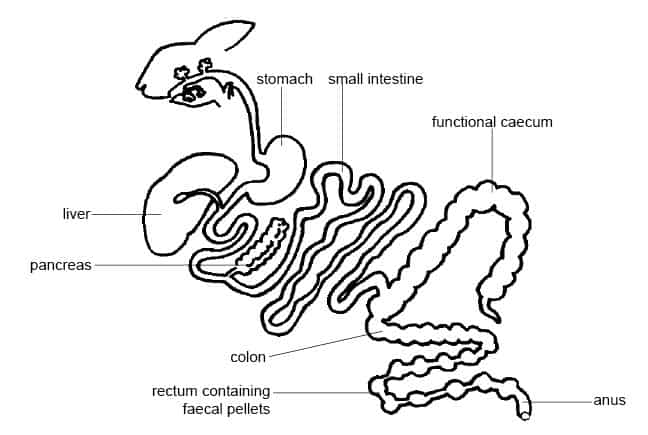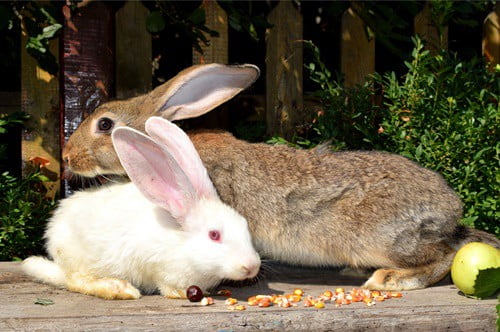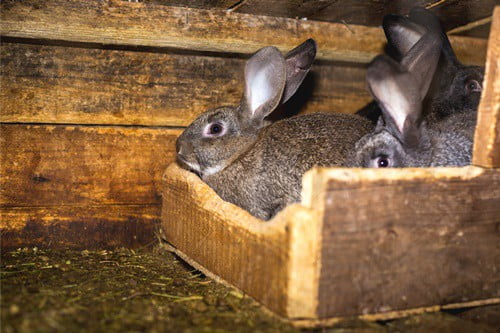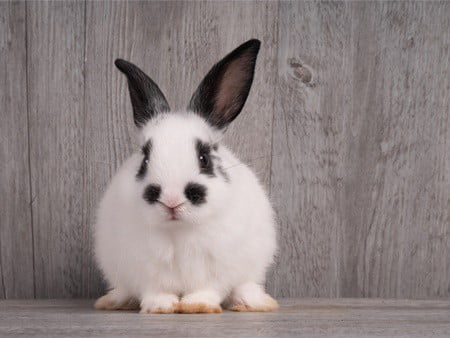A rabbit will pass gas as flatulence on occasion. This is a natural part of the digestive process, but if a rabbit has constant gas, something may be wrong with your pet.
An inappropriate diet is the likeliest reason for flatulence in rabbits. Food that’s high in carbohydrates or sugar causes gas. Stress, eating quickly, and dehydration also cause gas.
If left untreated, gas can lead to GI stasis. This is a critical illness that kills most rabbits within 24 hours. Ensure that your rabbit eats an appropriate diet, and treat gas urgently if it arises.
Why is My Rabbit’s Stomach Making Noises?
A rabbit’s stomach should always make sounds. This suggests she is processing food naturally. Hold your ear to your rabbit’s stomach. You should hear a low, soft gurgle.
A silent stomach suggests that your rabbit is not processing food. This almost certainly means GI stasis. According to The Veterinary Nurse, this condition is usually fatal.
A rabbit’s stomach making a loud gurgling is also concerning. You should not hear a rabbit’s stomach unless you are actively listening. A louder noise means that your rabbit has gas.
Some rabbits are more prone to gas than others. The breed and size of your rabbit will not influence this. Be vigilant about watching for the symptoms. Gas must always be treated.
Can Rabbits Pass Gas Naturally?
Flatulence is natural and essential to rabbits. Unlike many herbivores, rabbits lack a unique stomach for processing plant-based foods.
When a rabbit eats, her food works through the digestive tract. The textbook Anatomy and Physiology of Animals explains this with a diagram (fig. 110, p141).

- Food enters the stomach
- The stomach passes food to the small intestine
- The small intestine passes food to the cecum, a pouch at the top of the colon
- The food remains in the cecum overnight
- The cecum extracts nutrition from the food, and ferments the remainder
- As the food ferments, it produces gas
- The cecum releases this gas to the colon
- The gas passes through the length of the colon
- The gas is expelled through the anus as flatulence
If the above process is not followed, your rabbit will not pass wind. This will cause a painful build-up of gas. This must be treated quickly and efficiently.
How to Tell if a Rabbit Has Gas
The common symptoms of gas in rabbits include:
- Loud, gurgling stomach
- Pushing the stomach against the floor
- Lethargy
- The stomach is hard to the touch
- Inability to defecate
- Reduced appetite
- Hunched posture
- Grinding teeth
- Flatulence
- Body temperature below 100 degrees Fahrenheit
A low body temperature is worrying. This suggests that gas pain has sent your rabbit into shock. Address this before any other concerns.
Foods That Cause Gas in Rabbits
Gas is often linked directly to food intake. Fresh hay should make up 90% of your pet’s diet. This provides your rabbit with fiber.
Fiber is essential to healthy rabbits. It keeps the digestive tract moving. This is why soft gurgling is a healthy sound. It means your rabbit is continuously digesting her food. As rabbits graze hay all day, this is essential.
If your rabbit is prone to gas, do not feed her pellets. These are not essential for adult rabbits. A rabbit aged three months or over no longer needs the protein that pellets offer. Excessive protein can cause stomach bloat in rabbits.

Never feed a rabbit with commercial-grade muesli. This diet will lead to gas problems. Your rabbit will pick at the sweet ingredients and ignore her hay. This will lead to a lack of fiber in her diet.
Be mindful of fresh fruit and vegetables when feeding your rabbit. Foods high in sugar or carbohydrates cause gas. Never exceed two cups of fresh vegetables per day in your rabbit’s feed. Keep fruit, including berries, to a minimum. Be sparing with the following:
- Broccoli
- Cabbage
- Carrots
- Collard
- Kale
- Pumpkin
- Sprouts
All of these foods are frequently linked to gas in rabbits. Keep portions small and restricted to occasional treats. Offer an unlimited supply of timothy hay to make up any shortfall.
Alternative Reasons for Gas in Rabbits
If your rabbit has an appropriate diet, consider other explanations for her gas. These include:
- Eating too quickly
- Stress
- Dehydration
If your rabbit is prone to gas, you must learn the trigger. You can use this information to prevent the problem from recurring.
My Rabbit Eats Too Fast
How your rabbit eats is as important as what she eats. A rabbit eating quickly will swallow air and risk a gas embolism. This air cannot be expelled through the mouth. Rabbits are incapable of belching as their stomachs lack the strength.
If your rabbit eats quickly, consider why. Common explanations include:
- Hunger
- Anxiety
- Palatability
You may be feeding your rabbit later than she would like. Most rabbits wake up in the early evening. Your pet will be ready to eat. If she has to wait, she will be increasingly hungry.
If your rabbit shares a hutch, she may have food anxiety. Rabbit pairs respect a strict dominant/submissive hierarchy. The dominant rabbit will usually eat first. A submissive rabbit may rush food, in case it is taken away.
Consider the food that you offer your pet. Most rabbits enjoy sweet tastes and will rarely decline a treat. This is why muesli is so harmful to rabbits. Your pet will hurriedly eat any raisins and dried fruit.
Get your rabbit into a reliable feeding schedule. If you have multiple rabbits, feed them in separate areas. Most importantly, ensure your rabbit eats hay. Hay is tough and requires plentiful chewing. It cannot be eaten quickly.
Stress Causes Gas
The Journal of Physiology explains that emotional stress impacts a rabbit’s thyroid gland. A rabbit with an overactive thyroid will experience gas build-up. Ergo, gas is linked to stress in rabbits.
Rabbits do not cope well with anxiety. You must avoid common stress triggers. These include:
- Changes to an established routine
- New and unique experiences
- Exposure to potential predators
- Excessive light
- Excessive heat
- Small, cramped living quarters
- Lack of exercise
- Excessive time spent without company
- Physical pain
Keep your rabbit calm. Fill her life with positive experiences and build a strong bond.

Dehydration Causes Gas
Water is essential in preventing gas. If a rabbit does not drink enough, her electrolytes become imbalanced. Her body will retain what water it already has in response. This can trap gas in the abdomen.
If your rabbit will not drink, there must be a reason. It may be the taste. Rabbits are cautious. If the water tastes contaminated in any way, rabbits avoid it. This is likeliest if your rabbit eats but will not drink.
As well as avoiding gas, rabbits need water to survive. Dab honey on the spout of your rabbit’s water bottle. The sweetness of the honey will encourage your rabbit to drink again.
If your rabbit has stopped eating as well as drinking, make an urgent veterinary appointment. This is a warning sign of GI stasis.
Can Rabbits Die from Gas?
Gas in a rabbit’s stomach forms bubbles that block blood vessels. When this happens, blood cannot circulate around your rabbit’s body. This is referred to as a gas embolism.
As explained in Stroke, a gas embolism prevents blood from reaching a rabbit’s essential organs. With no blood reaching the brain, your rabbit’s motor functions will be impaired. An untreated gas embolism eventually leads to death through organ failure.
Gas can also obstruct your rabbit’s digestive tract. This is known as GI stasis. This occurs when food cannot pass a gas bubble to reach the digestive tract.
Undigested food remains in your rabbit’s stomach. This makes your rabbit uncomfortable and unwilling to eat or drink. Rabbits cannot survive longer than 24 hours without sustenance. This makes GI stasis a medical emergency.
Treating Gas in Rabbits at Home
Take your rabbit’s temperature. Anything below 100 degrees Fahrenheit is dangerous. Your rabbit is likely in shock due to gas pain. There are several ways to raise a rabbit’s temperature:
- Hold your rabbit, sharing your body heat.
- Lay the rabbit on a hot water bottle
- Loosely wrap the rabbit in a blanket or towel
- Shine a heat lamp on your rabbit
When the rabbit is warm, massage her stomach. Place your hands on either side of your rabbit’s stomach and rock gently. You will hear her stomach gurgle. If successful, your rabbit will pass wind.
If your rabbit has cleared her gas, she must eat and drink. The pain will have affected her appetite. She will require sustenance.
Offer your rabbit a favored treat or baby food. If her gas has cleared, she will accept this. If not, the problem could be more severe. Make a veterinary appointment, but administer medication.
Medication for Rabbits with Gas
Pediatric medications can be used to aid a rabbit with gas. If your rabbit accepts medication from a syringe, use this. Mylicon Drops are rabbit-safe. This medication also has a sweet taste. This makes it palatable to rabbits.
Offer a rabbit one pipette of Mylicon Drops every 45 minutes. Release the drops slowly. Emptying the pipette in one motion is dangerous. It could flood your rabbit’s lungs with liquid.
Gas will be painful for your rabbit, but never offer her human medication. Ask your vet for Metacam. This is a rabbit painkiller. Metacam must only be used in an emergency and limited to one dosage every 24 hours.
Vet Treatment for Gas in Rabbits
A vet will undertake further testing on a rabbit with gas. This will uncover the issue. Your rabbit may not have gas, but GI Stasis. This will require urgent treatment.
If necessary, your rabbit will undergo surgery. This will remove blockages from your pet’s colon. If surgery is not required, a vet will use specialist medication. This could include laxatives, painkillers, and an appetite stimulant. Intravenous fluids will be provided, if needed.
A vet may wish to perform further tests. These will check for any underlying illness. If your rabbit is prone to chronic gas, she needs these tests ASAP.


Thank you . This is very helpful in info for me.
I can tell something is off with my bun but sometimes he just confuses me. I do appreciate the info
I can’t tell you how much I understand! Sometimes I think mine is super sick & I’m panicking and considering taking him to the vet & then not too long after he goes & eats like normal? He’s so hard to figure out. I know that sometimes my guy gets gas pain & then problems pooping but it doesn’t last too long & he gets through it. 🙏 🤗